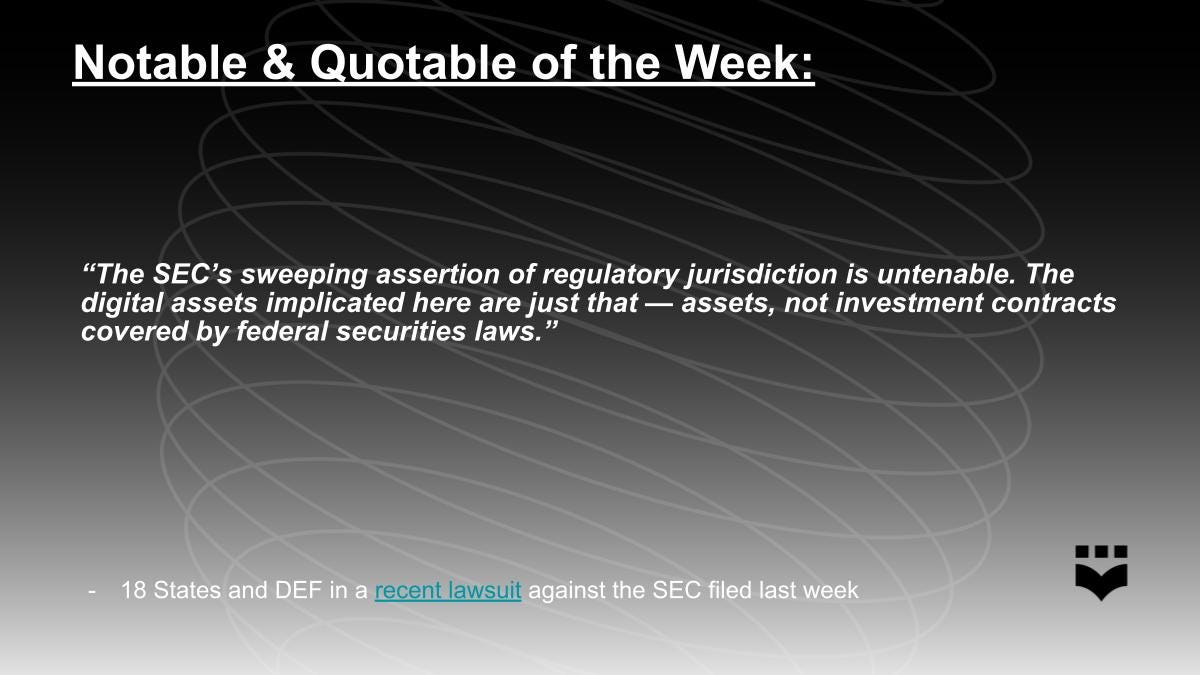States v. SEC; Rep. Hill Calls for Post-Election Rulemaking Timeout
States v. SEC
What happened?
Last week, 18 states and DEF filed a lawsuit against the SEC in the Eastern District of Kentucky to clarify the law related to digital assets and prevent the SEC from “continuing its unlawful campaign of regulatory overreach” in crypto (KY / NE Press Releases; Complaint).
The complaint asks the Court to issue an order enjoining the SEC from bringing further enforcement actions premised on the failure of digital asset secondary market trading platforms to register as securities exchanges, dealers, brokers, or clearing agencies, and to declare:
that a “digital asset transaction is not an investment contract” under the securities laws “if it does not transfer any stake in any enterprise that the seller or anyone else has an obligation to manage for the asset owner’s benefit and share resulting profits”;
that digital asset platforms that facilitate secondary transactions that lack those characteristics need not register as securities exchanges, dealers, brokers, or clearing agencies;
that the SEC violated the Administrative Procedure Act (APA) by adopting a policy that secondary transactions in common digital assets are uniformly “investment contracts,” and platforms that facilitate such transactions are securities exchanges, broker-dealers, and clearing agencies subject to registration requirements; and
that the SEC’s refusal to promulgate that policy through notice-and-comment rulemaking violated the APA.
What does this mean?
It’s important to keep advocating against the SEC’s unlawful actions despite the election. At a minimum, this lawsuit will give the new administration the opportunity to go on the record affirmatively refuting the unlawful practices of the SEC under Gary Gensler, as appropriate. Even if the SEC were to do rulemaking related to digital assets tomorrow, allowing for a proper notice and comment period takes time, won’t be initiated until a Chairman is confirmed, and could be tied up in court for years. The SEC’s expansive and vague definition of a security has allowed the SEC to interfere with state regulatory authority related to consumer protection and money transmission, effectively allowing the SEC to interfere with new and dynamic economic sectors at will.
Rep. Hill Calls for Post-Election Rulemaking Timeout
What happened?
Last week, House Financial Services Committee Digital Assets Subcommittee Chairman French Hill (R-AR) sent a letter to federal financial regulators calling on each to halt all rulemaking actions pending the inauguration. Representative Hill explained that the current approach to rulemaking has “stifled economic growth and innovation, and restricted consumer access to financial products.” Therefore, Chair Hill argued that as a matter of “transparency and public accountability” the agencies should halt all rulemaking until the new administration takes power.
What does this mean?
Chair French Hill’s letter falls within the “midnight rulemaking” period in which federal regulators sometimes attempt to push through last minute rulemaking before a new administration enters office. For example, at the end of the last Trump administration, the Treasury Department attempted to severely restrict self-custody and the use of self-hosted wallets. Chief among the potential midnight rulemaking threats for DeFi is the Internal Revenue Service’s (IRS) “Broker” rulemaking for non-custodial industry participants.
Be sure to check out a new DEF Blog post from our Policy Intern, Gavin Zavatone, that explores the United States’ AML/CFT policies in the wake of the recent TD Bank Settlement.



